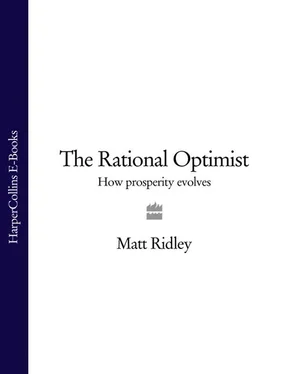I am happy to cheer, with Deirdre McCloskey: ‘Hurrah for late twentieth-century enrichment and democratisation. Hurrah for birth control and the civil rights movement. Arise ye wretched of the earth’. Interdependence through the market made these things possible. Politically, as Brink Lindsey has diagnosed, the coincidence of wealth with toleration has led to the bizarre paradox of a conservative movement that embraces economic change but hates its social consequences and a liberal movement that loves the social consequences but hates the economic source from which they come. ‘ One side denounced capitalism but gobbled up its fruits; the other cursed the fruits while defending the system that bore them.’
Contrary to the cartoon, it was commerce that freed people from narrow materialism, that gave them the chance to be different. Much as the intelligentsia continued to despise the suburbs, it was there that tolerance and community and voluntary organisation and peace between the classes flourished; it was there that the refugees from cramped tenements and tedious farms became rights-conscious consumers – and parents of hippies. For it was in the suburbs that the young, seizing their economic independence, did something other than meekly follow father and mother’s advice. By the late 1950s, teenagers were earning as much as whole families had in the early 1940s. It was this prosperity that made Presley, Ginsberg, Kerouac, Brando and Dean resonate. It was the mass affluence of the 1960s (and the trust funds it generated) that made possible the dream of free-love communes. Just as material progress subverts the economic order, so it also subverts the social order – ask Osama bin Laden, the ultimate spoilt rich kid.
Yet for all the liberating effects of commerce, most modern commentators see a far greater threat to human freedom from the power of corporations that free markets inevitably throw up. The fashionable cultural critic sees himself or herself as David slinging stones at vast, corrupt and dehumanising Goliath-like corporations that punish, pollute and profiteer with impunity. To my knowledge, no large company has yet featured in a Hollywood movie without its boss embarking on a sinister plot to kill people (in the latest one I watched, Tilda Swinton somewhat predictably tried to kill George Clooney for exposing her company’s poisoning of people with pesticides). I hold no brief for large corporations, whose inefficiencies, complacencies and anti-competitive tendencies often drive me as crazy as the next man. Like Milton Friedman, I notice that ‘business corporations in general are not defenders of free enterprise. On the contrary, they are one of the chief sources of danger.’ They are addicted to corporate welfare, they love regulations that erect barriers to entry to their small competitors, they yearn for monopoly and they grow flabby and inefficient with age.
But I detect that the criticism is increasingly out of date, and that large corporations are ever more vulnerable to their nimbler competitors in the modern world – or would be if they were not granted special privileges by the state. Most big firms are actually becoming frail, fragile and frightened – of the press, of pressure groups, of government, of their customers. So they should be. Given how frequently they vanish – by take-over or bankruptcy – this is hardly surprising. Coca-Cola may wish its customers were ‘ serfs under feudal brandlords’, in the words of one critic, but look what happened to New Coke. Shell may have tried to dump an oil-storage devicein the deep sea in 1995, but a whiff of consumer boycott and it changed its mind. Exxon may have famously stood out from the consensus by funding scepticism of climate change (while Enron funded climate alarmism
Конец ознакомительного фрагмента.
Текст предоставлен ООО «ЛитРес».
Прочитайте эту книгу целиком, купив полную легальную версию на ЛитРес.
Безопасно оплатить книгу можно банковской картой Visa, MasterCard, Maestro, со счета мобильного телефона, с платежного терминала, в салоне МТС или Связной, через PayPal, WebMoney, Яндекс.Деньги, QIWI Кошелек, бонусными картами или другим удобным Вам способом.












